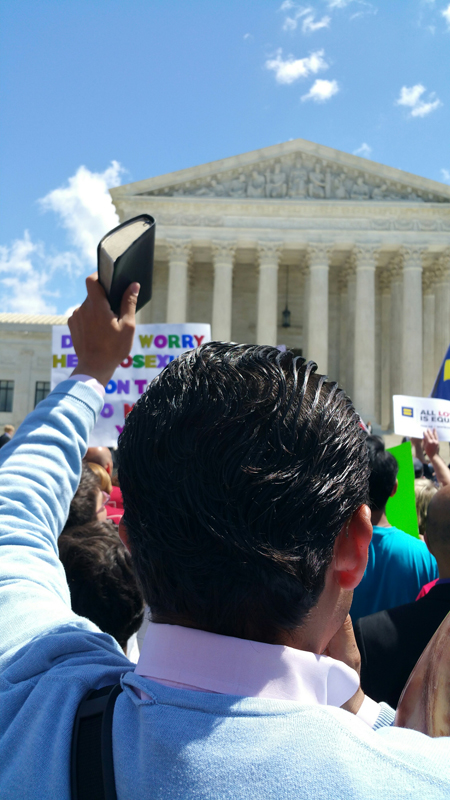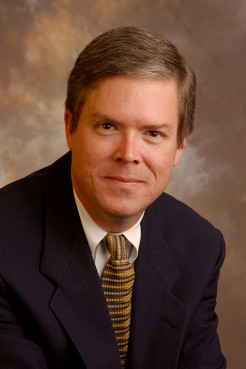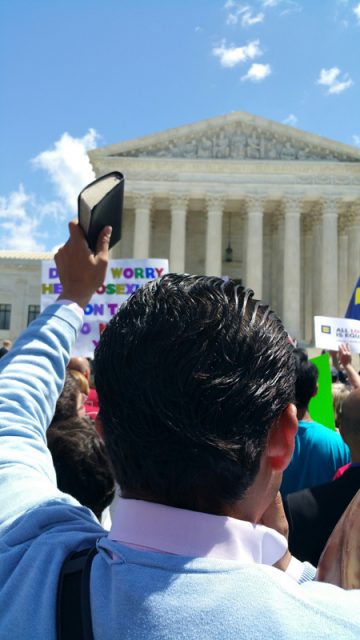
A man holds up a Bible in front of the Supreme Court on April 28, 2015, after justices hear arguments about same-sex marriage. Religion News Service photo by Kevin Eckstrom
(RNS) God speaks. Some people listen, some don’t. That’s the way it has always been. We have read it in our various religious texts. We have experienced it in our own lives. Revelatory moments.
In my holy Scriptures, the Bible, we read about times when God’s wisdom is conveyed to humanity and humanity changes. These revelatory moments are moments when God shows us that it is time to change our beliefs and behaviors. It first starts with an individual; then it moves to a group and on to society as a whole.
In the Hebrew Scriptures, we see it with Abraham and Isaac. Abraham grew up in a time that human sacrifice of the eldest child was a common practice. Everyone thought that God desired it to happen. As Abraham begins to strike Isaac, an angel of the Lord stops him. A revelatory moment. Abraham spares Isaac, and human sacrifice is no longer a given in society. Abraham doesn’t participate in human sacrifice ever again. Neither do the Israelites.
Later, Moses encounters the burning bush, where an angel of God orders him to free his people from the institution of slavery, a reality for the Israelite people that had been in place for generations. A revelatory moment. After initial resistance, Moses leads them out of Egypt. Many grumbled and some wanted to go back. Moses and his people kept moving forward across the sea and into the wilderness toward freedom, never to accept slavery for themselves ever again.
In Christian Scriptures, the New Testament, even Jesus encountered opposition from the religious leaders of his day, when he declared a revelatory moment by saying that loving God and loving your neighbor as yourself were the prime commandments to follow over all other regulations in Scripture.
I believe that marriage for same-sex couples presents another revelatory moment.
Every minister, priest, rabbi and imam must ask herself or himself whether to become more welcoming of same-sex couples in his or her community and as members of her or his congregation. Some have already had their revelatory moment. Many have not.
God has been speaking to people for decades, declaring that we should open up the synagogue, temple, church and mosque to gay and transgender individuals and not discriminate against them. The same is true for society as a whole. Marriage, the love between two individuals, should be free for all people, including same-sex couples.
A revelatory moment has two dimensions and definitions. The first is when God discloses a significant truth to us about our lives here on earth. The second is that the disclosure was previously unknown to us. Both are needed in order to have a revelatory moment. Those who claim God speaking to them to preserve the past or maintain the status quo are not having a revelatory moment.
Revelatory moments on a societal level can last for years. Some people get it early, others resist. Opposition rises. Steps are taken forward and backward. Conversations take place publicly and privately, and attitudes shift over time. The paradigm ultimately changes.
This month, the Supreme Court will rule on civil marriage rights. We will know if all 50 states are required under our U.S. Constitution to open up civil marriage to same-sex couples. Religious institutions will not be required to conduct marriages for same-sex couples. Yet, they should be willing to be open to the possibility. The conversation in religious institutions will continue for months and years to come.

David W. Key Sr. is director of Baptist studies at Emory University’s Candler School of Theology. Photo courtesy of David Key
Most of my evangelical colleagues want to eliminate the harsh and judgmental rhetoric that some in our community have used over the years. They are tired of being against everything. They want to be for good things in their respective communities. If marriage equality becomes the law of the land, we evangelicals must find a way to live with it. We must minister in the different context.
Join me in this revelatory moment. Listen for God. It will change your life and how you relate to those around you.
(David W. Key Sr. is director of Baptist studies at Emory University’s Candler School of Theology.)
DG/MG END KEY





